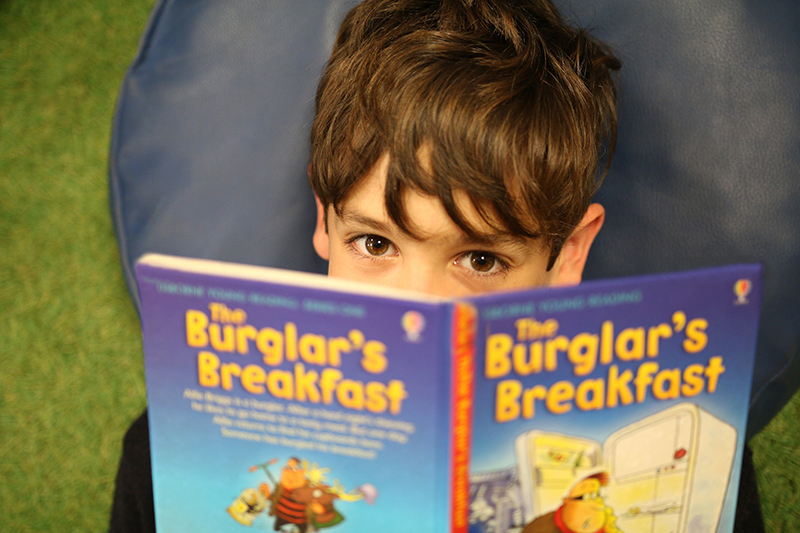
La lectura es una de las mejores herramientas para acercarse a una lengua ya que a través de ella ampliamos nuestro vocabulario y nos acercamos a la cotidianeidad del idioma y la cultura que lo envuelve.
Para que este verano podáis disfrutar de momentos relajantes, mientras avanzáis en el aprendizaje del inglés, os recomendamos que os organicéis un sencillo “Reading Corner” (un rinconcito para la lectura), donde os sintáis a gusto y nadie os moleste durante ese tiempo de bienestar.
En el ámbito educativo se ha demostrado pedagógicamente que las personas que disfrutan de lugares confortables para el estudio y la lectura obtienen mejores resultados académicos. Por ello, la creación de zonas emocionales, en las que nos sintamos cómodos, son muy recomendables ya que nos ponen en buena predisposición para la práctica placentera de la lectura.
Y es que la lectura en un segundo idioma nos ayuda a afianzar las destrezas adquiridas durante el curso y nos mantiene conectados con el conocimiento de manera divertida ya que seguimos aprendiendo sin darnos cuenta. Porque, como decía el excepcional poeta nicaragüense Rubén Darío, “el libro es fuerza, es valor, es poder, es alimento; antorcha del pensamiento y manantial del amor”.
Desde Caxton College te recomendamos varias lecturas veraniegas que te ayudarán a crecer en el aprendizaje de la lengua británica y a sentirte feliz en tu “Summer Reading Corner” que, si todavía no lo tienes, deberías diseñártelo cuanto antes.
Edades tempranas (3-6 años)
The Very Hungry Caterpillar de Eric Carle
The Smartest Giant in Town de Julia Donaldson
The Gruffalo de Julia Donaldson
Infantil (6-12)
Alexander and the Terrible, Horrible, No Good, Very Bad Day de Judith Viost
What to Do When You Worry Too Much: A Kid’s Guide to Overcoming Anxiety de Dawn Huebner
Brown Girl Dreaming de Jacqueline Woodson
Katie in London de James Mayhew
Charlotte’s Web de E.B. White
Finding Audrey de Sophie Kinsella
The Borrowers de Mary Norton
Matilda de Roald Dahl
Awful Auntie de David Walliams
Adolescentes (12-18)
I’ll Give You the Sun, de Jandy Nelson
The Hunger Games de Suzanne Collins
Harry Potter and the Sorcerer’s Stone de J.K. Rowling
The Hobbit de J.R.R. Tolkien
Adultos (+ de 18)
A Dangerous Sky de Michael Austen
A Love for Life de Penny Hancock
Deadly Harvest de Geoff Bond
Si precisas información más detallada sobre éste u otros temas relacionados con el estudio del inglés, estaremos encantados de ayudarte. Puedes encontrarnos en nuestra webwww.caxtoncollege.com o llamándonos al teléfono 961 424 500
¡Feliz Verano!
Choosing your “Summer Reading Corner”
Reading is one of the best ways of approaching a new language, not only because it expands our vocabulary, but also because it allows us to explore up close the everyday language people use, and the culture surrounding it.
This summer, if you’d like to enjoy some time relaxing with a good book, whilst also improving your English, what could be better than organising a simple “Reading Corner”, or quiet space just for reading, where you feel comfortable and where no-one will bother you during those well-spent moments.
In the field of education, it has been pedagogically demonstrated that people who have a comfortable place in which to study and read obtain better academic results. Therefore, creating an emotional area, in which we feel comfortable, is highly recommended as it already gets us ready and looking forward to enjoying a good read.
Added to this is the fact that reading in a second language helps us to strengthen the skills acquired during the course and links us to the previously taught knowledge in a fun way, so we continue to learn without even realising it. Because, as the noted Nicaraguan poet Rubén Darío said, “a book is strength, it is courage, it is power, it is food; it is the torch that illuminates thought and the wellspring of love”.
Here at Caxton College, we would like to recommend several summer books that will help you to improve your skills in English while enjoying the time spent in your “Summer Reading Corner”, which by the way, you should get started on as soon as possible, if you haven’t already done so!
Early Years (3-6 years)
The Very Hungry Caterpillar by Eric Carle
The Smartest Giant in Town by Julia Donaldson
The Gruffalo by Julia Donaldson
Primary (6-12)
Alexander and the Terrible, Horrible, No Good, Very Bad Day by Judith Viost
What to Do When You Worry Too Much: A Kid’s Guide to Overcoming Anxiety by Dawn Huebner
Brown Girl Dreaming by Jacqueline Woodson
Katie in London by James Mayhew
Charlotte’s web by E.B. White
Finding Audrey by Sophie Kinsella
The Borrowers by Mary Norton
Matilda by Roald Dahl
Awful Auntie by David Walliams
Teens (12-18)
I’ll Give You the Sun by Jandy Nelson
The Hunger Game by Suzanne Collins
Harry Potter and the Sorcerer’s Stone by J.K. Rowling
The Hobbit de J.R.R. Tolkien
Adults (18+)
A Dangerous Sky by Michael Austen
A Love for Life by Penny Hancock
Deadly Harvest by Geoff Bond
If you need more detailed information on this or other topics related to learning English, we will be happy to help. You can contact us on our website www.caxtoncollege.com, or by calling us at 961 424 500.
Have a good Summer!

















